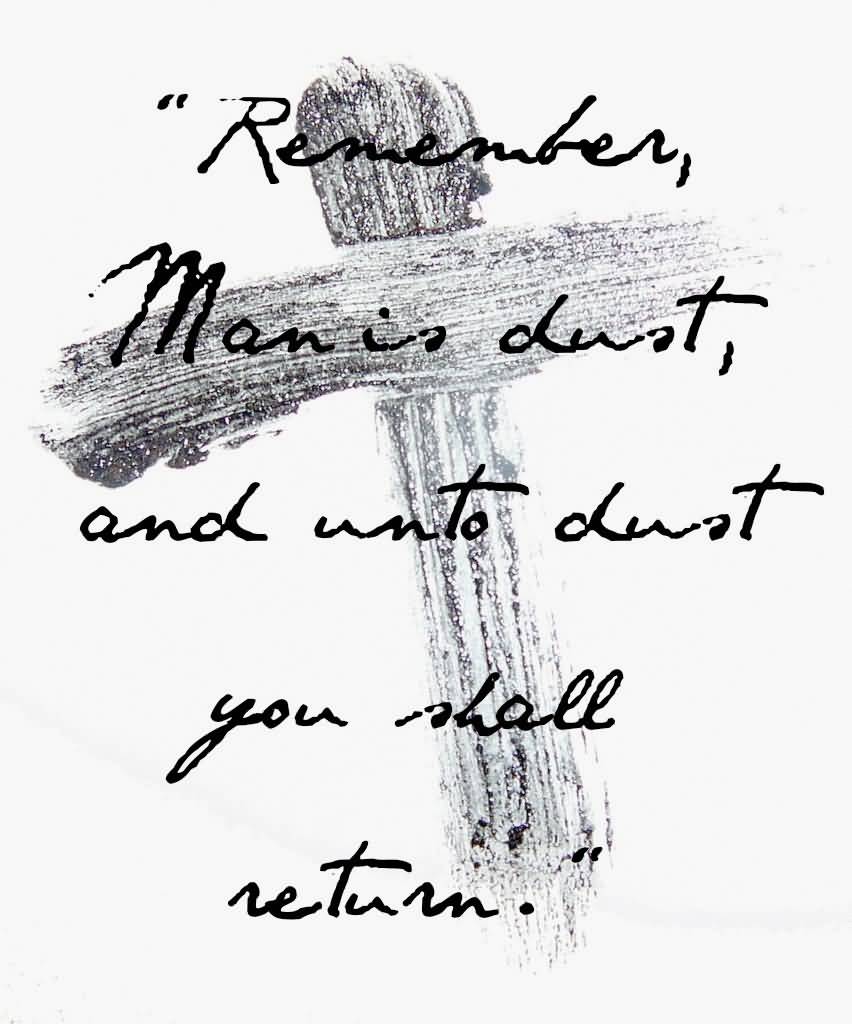

The most obvious places to look for memento mori meditations are in funeral art and architecture. Unshrouded skeleton on Diana Warburton's tomb (dated 1693) in St John the Baptist Church, Chester Memento mori has been an important part of ascetic disciplines as a means of perfecting the character by cultivating detachment and other virtues, and by turning the attention towards the immortality of the soul and the afterlife. A Biblical injunction often associated with the memento mori in this context is In omnibus operibus tuis memorare novissima tua, et in aeternum non peccabis (the Vulgate's Latin rendering of Ecclesiasticus 7:40, "in all thy works be mindful of thy last end and thou wilt never sin.") This finds ritual expression in the rites of Ash Wednesday, when ashes are placed upon the worshipers' heads with the words, "Remember Man that you are dust and unto dust, you shall return."

To the Christian, the prospect of death serves to emphasize the emptiness and fleetingness of earthly pleasures, luxuries, and achievements, and thus also as an invitation to focus one's thoughts on the prospect of the afterlife. In the Christian context, the memento mori acquires a moralizing purpose quite opposed to the nunc est bibendum (now is the time to drink) theme of classical antiquity. The thought was then utilized in Christianity, whose strong emphasis on divine judgment, heaven, hell, and the salvation of the soul brought death to the forefront of consciousness. No matter one's station in life, the Dance of Death unites all. In Europe from the medieval era to the Victorian era ĭance of Death (15th-century fresco). Though in modern times this has become a standard trope, in fact no other ancient authors confirm this, and it may have been Christian moralizing rather than an accurate historical report. Hominem te memento" ("Look after you and remember you're a man."). The 2nd-century Christian writer Tertullian claimed that during his triumphal procession, a victorious general would have someone (in later versions, a slave) standing behind him, holding a crown over his head and whispering "Respice post te. The expression memento mori developed with the growth of Christianity, which emphasized Heaven, Hell, and salvation of the soul in the afterlife. In Isaiah, the lifespan of human beings is compared to the short lifespan of grass: "The grass withers, the flower fades when the breath of the LORD blows on it surely the people are grass" (Is. In Ecclesiastes, the Preacher insists that "It is better to go to the house of mourning than to go to the house of feasting, for this is the end of all mankind, and the living will lay it to heart" (Eccl. In Psalm 90, Moses prays that God would teach his people "to number our days that we may get a heart of wisdom" (Ps. Several passages in the Old Testament urge a remembrance of death. The Stoic Marcus Aurelius invited the reader to "consider how ephemeral and mean all mortal things are" in his Meditations. The Stoic Epictetus told his students that when kissing their child, brother, or friend, they should remind themselves that they are mortal, curbing their pleasure, as do "those who stand behind men in their triumphs and remind them that they are mortal".
Remember from dust you came full#
The Stoics of classical antiquity were particularly prominent in their use of this discipline, and Seneca's letters are full of injunctions to meditate on death. Plato's Phaedo, where the death of Socrates is recounted, introduces the idea that the proper practice of philosophy is "about nothing else but dying and being dead". The philosopher Democritus trained himself by going into solitude and frequenting tombs.

History of the concept In classical antiquity In other words, "remember death" or "remember that you die".

Memento is the 2nd person singular active imperative of meminī, 'to remember, to bear in mind', usually serving as a warning: "remember!" Morī is the present infinitive of the deponent verb morior 'to die'. In English, the phrase is pronounced / m ə ˈ m ɛ n t oʊ ˈ m ɔːr i/, mə- MEN-toh MOR-ee.


 0 kommentar(er)
0 kommentar(er)
